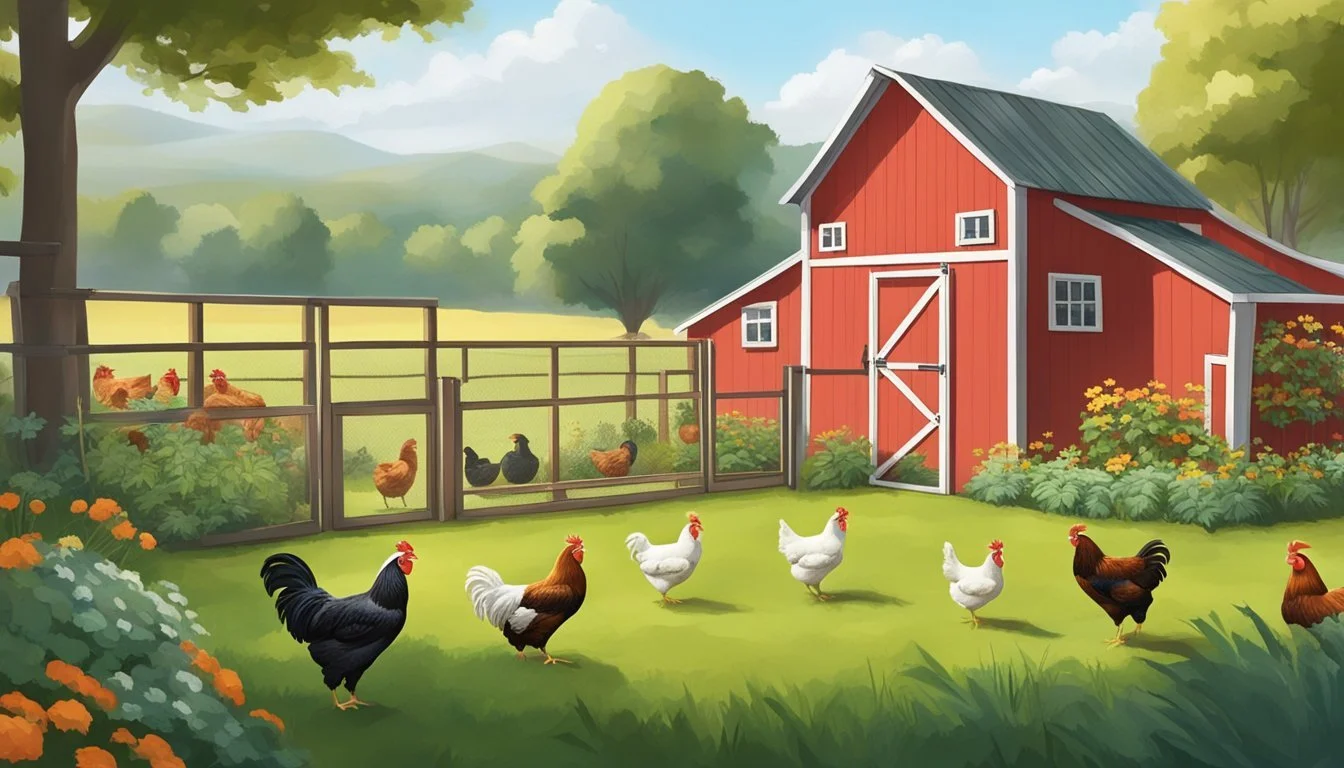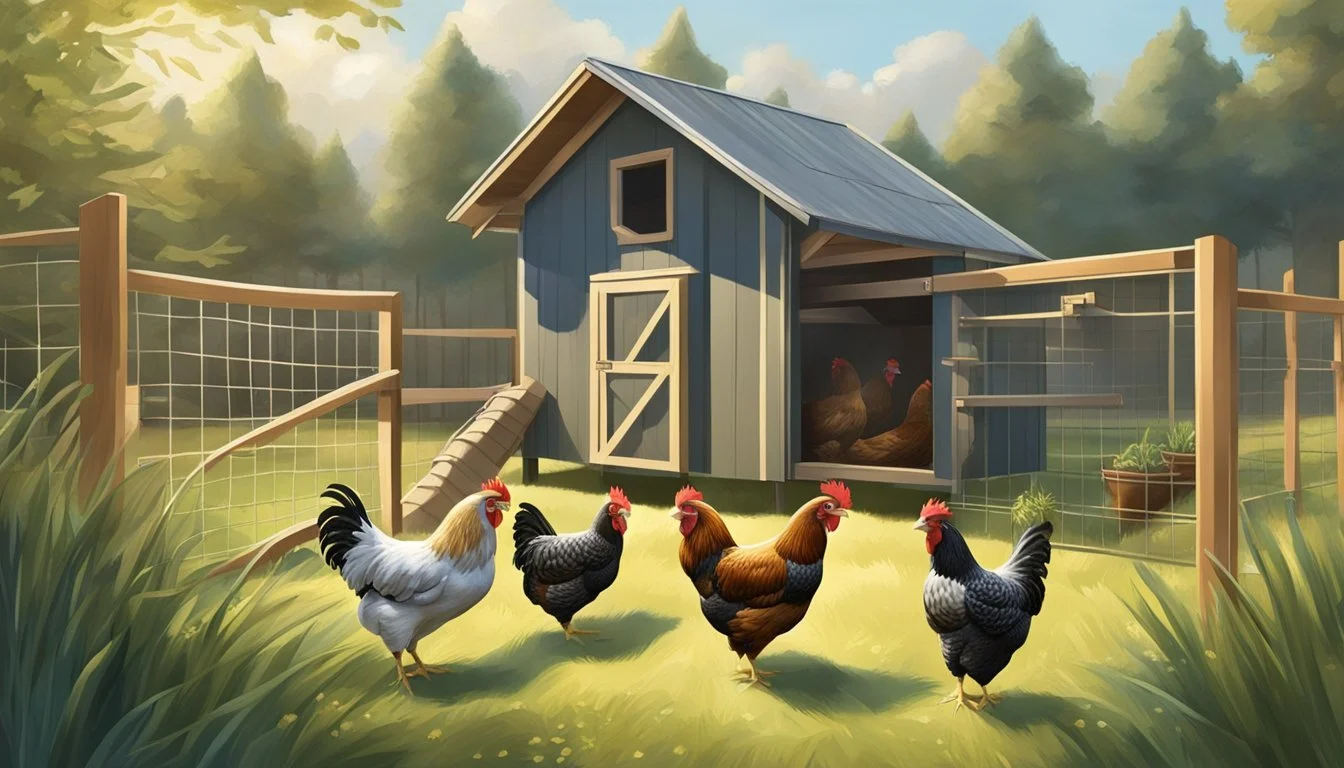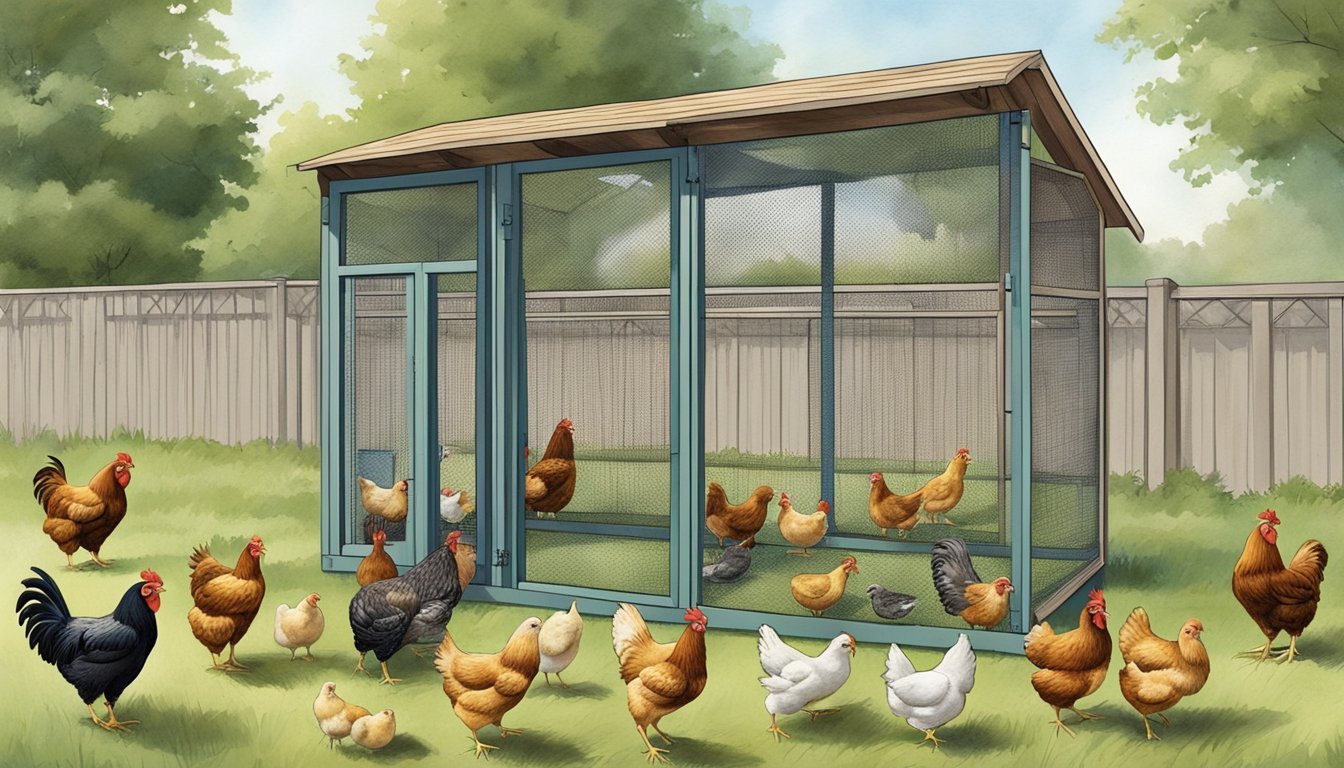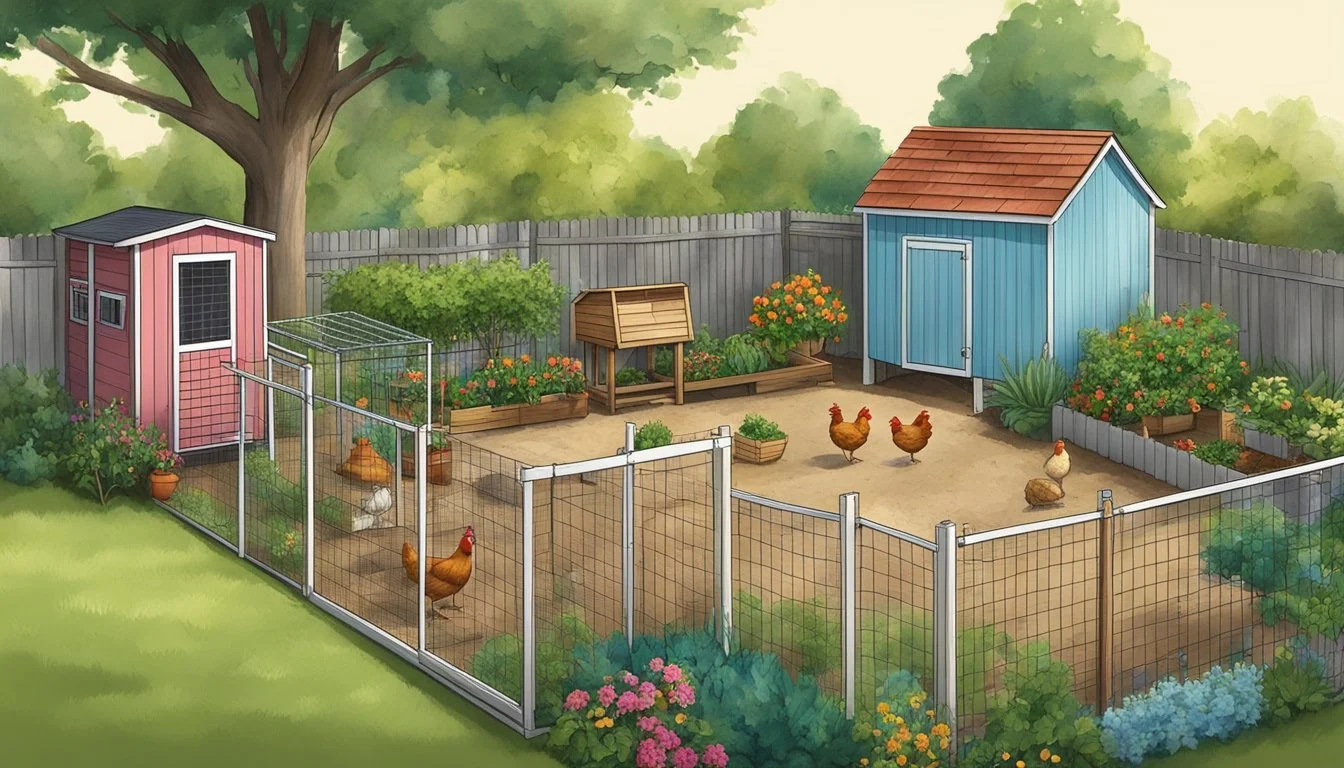Keeping Backyard Chickens in Topeka, KS
Essential Guidelines for Urban Poultry Farming
Raising backyard chickens is a burgeoning trend among residents of Topeka, KS, partly fueled by a growing interest in sustainable living and the appeal of fresh, home-produced eggs. Topeka's municipal codes set specific guidelines to ensure that the keeping of domestic fowl respects both the welfare of the animals and the peace of the neighborhood. Regulations include stipulations on the minimum space required, the maximum number of chickens per property, and necessary measures for maintaining sanitation and controlling noise.
In Topeka, adherence to Chapter 18-291 of the municipal code is crucial, as it establishes that keeping domestic fowl is permitted in accordance with other city ordinances, given that the chickens are kept at least 50 feet away from neighboring residences. Individual property size in Topeka determines the number of chickens allowed, with properties of at least 9,000 square feet able to accommodate up to 12 chickens.
Understanding these local ordinances is essential for any Topeka resident considering the addition of a backyard coop. The city's policies are designed to strike a balance between the privileges of chicken owners and the rights of the surrounding community, ensuring a harmonious coexistence. As these regulations are subject to change, potential and current chicken keepers are advised to consult with city authorities for the most current information, ensuring their practices are compliant and responsible.
Understanding Local Chicken Ordinances
Topeka residents interested in raising backyard chickens must adhere to specific local guidelines to ensure compliance with city ordinances.
Topeka's Chicken Ordinance Essentials
In Topeka, Kansas, the local ordinances dictate that domestic fowl can only be kept with certain restrictions concerning proximity to other properties, noise control, and sanitation. The Topeka Kansas Chicken Ordinance states that it is unlawful to maintain domestic fowl within 50 feet of any dwelling, apart from the owner's, without violating zoning restrictions.
Permit Requirements and Procedures
A permit is required for Topeka residents to keep backyard chickens. This involves submitting a permit application to the local authorities and paying any related fees. The application process ensures that all prospective chicken owners comply with the city's requirements for raising chickens.
Limitations on Number and Type of Chickens
The city has established guidelines regarding the limit on the number of chickens that can be kept. While search results do not specify these limits, one should consult the Topeka Municipal Code or local authorities for the exact number allowed. It should also be noted that roosters are often subject to more restrictions due to noise concerns.
Specific Regulations for Coops and Runs
Chicken coops in Topeka must meet certain criteria to comply with local ordinances. They should be:
Well-ventilated: To ensure proper air circulation for the chickens' health.
Predator-resistant: To protect the chickens from local wildlife.
Easy to maintain: To uphold sanitation standards and facilitate cleaning.
Coops must also abide by any proximity restrictions, maintaining an appropriate distance from neighbors' residences to mitigate any potential nuisances.
Choosing the Right Chicken Breed
When selecting chicken breeds for a backyard flock in Topeka, KS, it's crucial to consider beginner-friendly breeds, egg production capabilities, and the health needs of different breeds given the local climate.
Popular Breeds for Beginners
For beginners in Topeka, the Rhode Island Red is a resilient choice, as they are hardy in various weather conditions and known for their friendly temperament. Another recommended breed for novices is the Sussex, which is adaptable and suitable for colder climates often experienced in Kansas.
Egg Production and Breed Selection
Chickens are primarily kept for their fresh eggs, and breed selection directly impacts egg production. The Leghorn breed is an outstanding layer, producing a high number of eggs annually, typically around 280. Rhode Island Reds are not far behind, with admirable egg-laying abilities, generally yielding 200-300 eggs per year. When selecting a breed, consider the age at which they begin laying; pullets usually start producing eggs at about 18-24 weeks of age.
Breed of Chicken Estimated Eggs Per Year Age at First Egg Leghorn 280+ 16-18 weeks Rhode Island Red 200-300 18-24 weeks Sussex 250 20-24 weeks
Health and Maintenance Considerations of Different Breeds
Health and maintenance are paramount for a thriving flock. In Topeka's climate, which can experience extremes, the Ameraucana is an appropriate breed known for its ability to handle varying temperatures, while providing egg diversity with blue/green-tinted eggs. Breeds require different care levels, so choose one that aligns with your ability to provide shelter from the cold, adequate space, and consistent care.
Rhode Island Red: Tough and adaptable to cold, needs space to roam
Sussex: Prone to frostbite in extreme cold, requires warm coop
Ameraucana: Cold-hardy and enjoys both hot and cold climates, but needs protection from predators due to their docile nature
Designing and Maintaining Chicken Coops
Successfully keeping backyard chickens in Topeka, KS, hinges on the design and maintenance of the chicken coop. A well-executed coop ensures healthy chickens and complies with relevant Kansas ordinances.
Determining Appropriate Coop Size
Topeka ordinances mandate specific space requirements for chicken coops. Each chicken should have at least 4 square feet of space in the run. If the chickens do not have access to an outdoor range, provide at least 8 square feet inside the coop.
Coop Ventilation and Weatherproofing
Chickens require well-ventilated coops to maintain good air quality, but the structure must also withstand Kansas' varied weather. Ensure the coop has vents or windows that can be opened or closed to regulate temperature and adequate insulation to protect against the cold.
Routine Maintenance for Chicken Coops
Regular maintenance is essential for hygiene and the health of the chickens. Perform daily tasks such as replenishing food and water, weekly tasks like cleaning the floor and nesting areas, and monthly checks on structural integrity to prevent issues.
Creating Predator-proof Chicken Coops
Chickens in Topeka are at risk from predators like foxes and raccoons. Secure coops with solid, buried barriers, and consider adding wire mesh or hardware cloth. Lockable doors and roofs are necessary to deter climbing and flying predators.
Caring for Your Chickens
Caring for backyard chickens in Topeka involves meeting their dietary needs, understanding their developmental stages, and managing health concerns. Following these guidelines can lead to a thriving flock and optimal egg production.
Feeding and Watering Best Practices
For optimal health and egg production, chickens require a balanced diet and consistent access to clean water. Chickens should be fed a diet of layer pellets, which provide a comprehensive blend of proteins, vitamins, and minerals. Supplemental feed like grains, greens, and calcium sources can be offered, but should not exceed 10% of their diet. Clean, fresh water must be available at all times and should be replenished daily to prevent contamination.
Daily Diet for Adult Chickens:
Layer pellets: Majority of diet
Grains: Offered sparingly
Greens: In moderation
Calcium: For strong eggshells
Water:
Check and refill twice daily
Clean containers regularly
Provide shade to avoid overheating in summer
Understanding Chicken Growth Stages
Chickens grow from baby chicks to mature hens and roosters in distinct stages, each requiring different care. Baby chicks need a brooder for warmth and a starter feed rich in protein. As they grow, they transition to grower feed and need more space. By the time they reach 18-20 weeks, they are ready for layer feed, and hens will soon start producing eggs. Wyandotte and other breeds have specific growth milestones that caretakers should monitor.
Chick Growth Stages:
0-6 weeks: High-protein starter feed
6-18 weeks: Transition to grower feed
After 18 weeks: Switch to layer pellets
Managing Health Issues and Molting
Annual molting is natural for chickens, leading to a temporary pause in egg production as they shed and regrow feathers. During this time, they may require extra protein. Keep an eye out for signs of health issues, such as changes in behavior or appearance. Regular sanitation of the coop helps prevent disease and parasite infestation. Noise levels can be indicative of distress or illness, so understanding what is normal for your flock is crucial.
Molting Care:
Increase protein intake
Reduce stress in the environment
Monitoring Health:
Observe for behavioral changes
Maintain coop cleanliness
Schedule veterinary check-ups as needed
Daily and Seasonal Chicken Care Routines
Keeping backyard chickens requires consistent care, both daily and across the changing seasons. Specific routines in egg collection, weather adaptation, and predator protection are crucial for the health and productivity of the chickens.
Nesting Boxes and Egg Collection
Nesting boxes play a critical role in egg production and should be kept clean and comfortable for the hens. Egg collection should occur at least once a day to ensure eggs remain clean and are less likely to be broken or eaten by the chickens. Straw or shavings can be used as bedding in the boxes, which should be checked and changed regularly to maintain the hens' health and encourage consistent laying.
Coping with Extreme Weather Conditions
Chickens are resilient but require special care in extreme weather. During hot weather, adequate shade, ventilation, and access to clean water are crucial. On the contrary, cold weather demands a draft-free, well-insulated coop, but not necessarily heated, as chickens are capable of withstanding cold temperatures if kept dry and out of direct wind. It's important to prevent water from freezing in winter and provide dust bath areas during all seasons for the chickens to maintain their feather health.
Protection from Predators and Pests
Ensuring the safety of backyard chickens from predators and pests involves a multi-layer approach. Coops must be secured at dusk with strong latches, and run areas should have robust fencing, ideally buried underground to deter digging predators. Regularly inspect the coop for signs of entry or attempted entry by predators. Additionally, cleanliness and proper storage of feed reduce the attraction of pests that can bring disease or stress to the flock. Ducks, if present, also benefit from such protective measures and contribute to pest control due to their foraging habits.
Understanding the Chicken Life Cycle
The life cycle of a chicken encompasses distinct stages, from egg to adulthood, each requiring careful attention for the health of the birds.
From Chicks to Pullets: Early Development
Chicks emerge from eggs after an average incubation period of 21 days. These young chickens are vulnerable and require a warm environment, typically provided by a heat lamp or a broody hen. They grow rapidly, their downy feathers giving way to adult feathers. By 6 weeks of age, they are referred to as pullets.
Laying and Brooding: The Reproductive Cycle
Hens reach sexual maturity around 5 to 6 months when they begin to lay eggs. Healthy hens can lay an egg almost daily, with the presence of roosts and nesting boxes supporting this natural behavior. Laying can be affected by factors such as daylight and nutrition. Some hens may exhibit brooding behaviors, where they sit on eggs to incubate them.
Transition to Adulthood: Recognizing Maturity Signs
Pullets are considered adults at about 6 months of age. Signs of maturity include full feathering, the development of a comb and wattle, and in the case of roosters, the ability to crow. Adult chickens require less maintenance but need an environment that still protects them from predators and provides space to exhibit natural behaviors.
Community Involvement and Legal Considerations
Keeping backyard chickens in Topeka, KS involves navigating local ordinances and fostering positive relations within the community. Residents must be mindful of legal restrictions and the importance of engaging neighbors to maintain a harmonious environment.
Engaging with Kansas Chicken Communities
For residents interested in keeping chickens, connecting with the Kansas chicken community can provide invaluable support and resources. These communities often share best practices on coop management, care, and compliance with local laws. They serve as platforms for education and advocacy, striving to promote responsible backyard chicken keeping across Kansas.
Handling Neighbor Concerns and Noise Issues
When keeping chickens in Topeka, it's crucial to address potential concerns of neighbors, particularly around noise. In compliance with city regulations, chicken coops must be:
At least 50 feet from any residential dwelling, minimizing noise impact.
Constructed to maintain cleanliness and minimize odors.
Open communication with neighbors and implementing noise-reducing measures, such as properly positioning the coop, can help mitigate any disruptions caused by chickens.
Updates on Topeka and Kansas Chicken Laws
Law adherence is a cornerstone of responsible chicken keeping in Topeka. As of the latest information, Topeka's laws mandate:
Keep domestic fowl 50 feet away from residential structures.
Permit a maximum of 12 chickens on properties sized at least 9,000 square feet.
Roosters are permissible, but local noise ordinances must be respected.
Topeka residents are urged to stay informed of updates as ordinances can change, and variant rules may exist in nearby Kansas City or other municipalities in the state.
Additional Resources and Further Reading
For individuals seeking in-depth information about backyard chicken ordinances in Topeka, KS, the following resources provide comprehensive coverage:
Topeka Municipal Code: For the most current regulations, one should consult the Topeka Municipal Code, particularly Chapter 18-291. This source outlines the legal framework for keeping domestic fowl. (Last updated information may vary, check the municipal website for most current version.)
BackYard Chickens Forum: An online community where poultry enthusiasts discuss topics related to backyard chickens. The forum includes discussions on the Topeka Kansas Chicken Ordinance that could be valuable for understanding community practices and experiences.
ChickenLaws.com: A website dedicated to the legality of keeping backyard chickens in various jurisdictions. It provides details on permits, design requirements for coops, and other relevant legal considerations for Topeka residents.
Local Agriculture Extension Offices: These offices can offer guidance on best practices for poultry care. Kansas State University's extension office may provide updated information and advice suited to the Topeka climate and conditions.
Animal Control Office: Reach out to the local animal control office for clarification on licenses, permits, and any recent updates to the ordinances affecting the keeping of backyard chickens.
A well-constructed table or bookshelf can keep these resources organized and easily accessible for reference. Interested parties are encouraged to review these resources regularly, as the regulations surrounding backyard chickens can change. It is essential to stay informed to ensure compliance with current laws and community standards.









